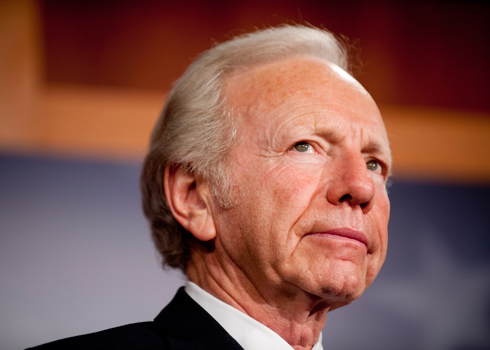Sen. Joe Lieberman (I-CT), the man whose rich and varied political career has seen him become a one-time Democratic vice presidential nominee, a party apostate, and then a prodigal son of sorts, has now made it official — announcing that he will retire from the Senate in 2012, after four terms in office.
Lieberman began the announcement by thanking his wife Hadassah, and telling a joke. “I was thinking about a year into the Senate service, with all the back and forth travel, it’s not easy on the spouses. And Hadassah said to me, ‘Joey, how long are you gonna stay in the Senate?’
“And I said, ‘Sweetie, I want to make a promise to you: I promise that when Regis leaves television, I’ll leave the Senate. And here we are.”
Lieberman’s announcement follows yesterday’s news that a high-profile Democrat, former Connecticut Secretary of State Susan Bysiewicz, was jumping into the race. The news was a clear sign that even though Lieberman had publicly mulled running again as a Democrat, there were a good number of state Dem politicians who were not willing to give him a free pass. And in addition, the polls showed that he would face a serious uphill climb in trying to win.
[TPM SLIDESHOW: Broken Promises: The Story Of Joe The Democrat]
It’s been a long Senate tenure for Joe Lieberman. In 1988, he was elected to the Senate after serving as state Attorney General, in a major upset against incumbent moderate Republican Lowell Weicker, after running to Weicker’s left on some issues and to his right on others. (Known as the “one-two punch.”) In 2000, Al Gore selected him as his running mate for the presidential election, making him the first practicing Jew on a national ticket — only to win the national popular vote, but lose in the Electoral College following the disputed result in Florida.
Lieberman then returned to his post in the Senate, with an eye on running for president against George W. Bush in 2004. But he then seriously alienated the left by siding strongly with Bush on a key issue of the decade: The Iraq War. Even though other contenders such as the eventual nominee John Kerry voted for the war, Lieberman was especially strident in his support for it. As a result, his campaign went nowhere fast, with his words furnishing such punchlines for his liberal detractors as “Joementum” and “a three-way split decision for third place.”
But progressive activists weren’t content with just telling jokes about Lieberman — they aimed to take him out of the Senate in the 2006 Democratic primary, ultimately getting behind businessman Ned Lamont, who upset Lieberman in the primary by a margin of 52%-48%. But Lieberman didn’t take that sitting down, and had announced his intention to gather petitions and continue running as an independent if he lost the primary — a decision that might just have contributed to that very primary loss.
Lieberman was then re-elected as an independent with unofficial but nevertheless quite solid Republican support. He remained in the Democratic caucus — as he’d pledged to do during that campaign — but he continued to tweak the left on national security. He then took the ultimate step out of the party tent by endorsing and campaigning aggressively for John McCain for president in 2008, speaking at the Republican National Convention, and attacking Barack Obama.
But Lieberman never switched parties and joined the Republican caucus. After McCain lost the election to Barack Obama, Lieberman settled back into place in the Democratic caucus, and was even permitted to keep his position as Chairman of the Homeland Security and Governmental Affairs Committee.
During the health care reform debate, Lieberman further inflamed liberals by helping to stop the public option proposal, promising to support a Republican filibuster. He did in fact ultimately vote for final passage of the more conservative reform law that did not include a public option — and which is a bane to Republican voters. In the last few weeks, he did some solid work for progressives by taking a lead role on the repeal of the ban on gays in the military.
This past October, a survey from Public Policy Polling (D) found Lieberman running in third place in various trial heats with hypothetical Democratic and Republican candidates, with only marginally positive ratings from Republican voters and deeply negative ratings with Democrats and independents.
Late Update: During his speech, Lieberman denied that re- election difficulties were the cause of his retirement. “I know that some people have said if I ran for re-election, it would be a difficult campaign for me. So what else is new?”
“It probably would be difficult for me, but I’ve run many difficult campaigns before,” he said, starting with his 1970 Democratic primary challenge to the state Senate majority leader, his 1988 Senate campaign, and the 2006 race. And he thanked all of his supporters for their help in winning those races.
“I have never shied from a good fight, and I never will,” he said. “So the reason I have decided not to run in 2012 is probably best expressed by the words in Ecclesiastes: ‘To everything there is a season, and a time for every purpose under Heaven.'”









